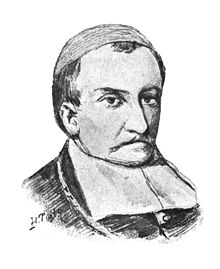Gallus Anonymus

Gallus Anonymus, also known by his Polonized variant Gall Anonim, is the name traditionally given to the anonymous author of Gesta principum Polonorum (Deeds of the Princes of the Poles), composed in Latin between 1112 and 1118. Gallus is generally regarded as the first historian to have described the history of Poland. His Chronicles are an obligatory text for university courses in Polish history. Very little is known of the author himself and it is widely believed that he was a foreigner.
Kromer

The only source for Gallus' real name is a note made by
The Heilsberg manuscript, one of three extant witnesses of the Gesta, was written between 1469 and 1471. From the mid-16th to 18th centuries, it was kept in the town of Heilsberg (today
Origin
The author of the Gesta wrote little about himself and was not written about in contemporary sources. What Gallus did write about himself may be summed up as follows: Before going to Poland, he likely spent some time in
Historians agree that Gallus' writing style indicates a substantial education, available only to nobles and monks; and that he was an experienced writer, thus likely also to have authored earlier works. The clericus de penna vivens ("cleric living by his pen") is suspected by Danuta Borawska[2] and Marian Plezia[3] to have earlier penned the Gesta Hungarorum (Deeds of the Hungarians) and the Translatio Sancti Nicolai (The Transfer of St. Nicholas); and his writing style is thought to have been influenced by recent literary developments that were then common only in northern France and the Netherlands.

Budapest's Vajdahunyad Castle features an evocative bronze statue of a seated Anonymus in monk's habit, the cowl obscuring his face.
Gallus' place of origin is unknown. Several theories have been advanced. Traditional scholarship has assumed that he was French (hence Gallus), perhaps from France or Flanders.[4] Plezia has suggested that he was a monk from Saint Giles' Monastery in Provence, France.[3]
Some scholars have pointed out that Gallus' writing style resembles that of Hildebert of Lavardin (aka Hildebert of Tours) and have thought that Gallus had been educated at Le Mans or, according to Zathey,[5] at Chartres or Bec in Normandy.
Before World War II, French historian Pierre David advanced a theory that Gallus might have been a Hungarian monk from Saint Giles' Monastery in Somogyvár who accompanied Boleslaus in his return from Hungary to Poland. This theory enjoys little support.[6]
Another theory has been gaining ground in Poland. Professors Danuta Borawska and
The Venetian theory was first broached in 1904 by Polish historian
According to Tomasz Jasiński, who in 2008 published a book on Gallus,[12] the chronicler came to Poland over the Via Egnatia across the Slavic-speaking countries of "Epirus, Thrace, Dalmatia, Croatia, Istria." When Jasiński compared the Chronicle with the Transfer of St. Nicholas, he found over 100 similarities. Jasiński has concluded that Gallus, like many Venetian clergymen of the time, had a native knowledge of both Italian and Slavic languages.[13]
However, Paul W. Knoll and Frank Schaer regard the Venetian suggestion as "too weak to be considered seriously."[14] In Poland, medievalist Professor Jacek Banaszkiewicz supports a French over an Italian origin for Gallus Anonymus.[11]
Influence
The anonymous author of the Gesta influenced the subsequent course of Poland's history, in that his version of early Polish history held the ruler's authority to be inferior to that of God, as expressed by the voice of the people (as in the Latin proverb, "Vox populi, vox Dei").
This concept reinforced Poles' electoral traditions and their tendency to disobey and question authority. Via the
See also
Notes
- ^ a b c Paul W. Knoll and Frank Schaer, eds., Gesta Principum Polonorum: The Deeds of the Princes of the Poles, Budapest, 2003, pp. xxiv—v.
- ^ Danuta Borawska, "Gallus Anonim czy Italus Anonim?" ("Gallus Anonimus or Italus Anonimus?"), Przegląd Historyczny (Historical Review), 1965.
- ^ ISBN 83-7316-258-5.
- ^ Paul W. Knoll and Frank Schaer, eds., Gesta Principum Polonorum..., pp. xxvii—ix.
- Polish Academy of Learning), 1952, z. 7-10, p. 555.
- ^ Pierre David, "La Pologne dans l’obituaire de Saint-Gilles en Languedoc au XII e sičcle", Revue des Études Slaves, 19 (1939).
- ^ Danuta Borawska, Mała Historia Literatury Polskiej (A Brief History of Polish Literature), Warsaw, PWN, 2005, pp. 52-53.
- ^ a b c d (in Polish) Roman Sidorski, Interview with Professor Tadeusz Jasiński: Kierunek – Wenecja!, Histmag, 2006-04-10.
- ^ "Historians Know Who Gallus Anonymus Was". Archived from the original on 2009-03-06. Retrieved 2007-01-17.
- ^ "Nowe studia nad Gallem-Anonimem" ("New Studies about Gallus Anonymus"), in Mente et litteris. O kulturze i społeczeństwie wieków średnich (Mente et litteris: On Culture and Society in the Middle Ages), Poznań, 1984, pp. 111-20; Anonim tzw. Gall, Kronika polska (The Anonymous "Gaul," The Polish Chronicle), edited by Marian Plezia, translated [from the Latin into Polish] by Roman Grodecki, Wrocław, 1996.
- ^ a b c Na tropie tajemnicy Galla Anonima Archived 2018-02-12 at the Wayback Machine, Polish Press Agency, 2006-02-15.
- ISBN 978-83-60448-37-3.
- Littoral Monk]." See Tomasz Jasiński, "Was Gallus Anonymus, Monachus Littorensis?" Summaries, Kwartalnik Historyczny (Historical Quarterly), CXII, 2005, 3. (abstract 1 Archived 2007-09-26 at the Wayback Machine, abstract 2 Archived 2007-04-27 at the Wayback Machine)
- ^ Paul W. Knoll and Frank Schaer, eds., Gesta Principum Polonorum..., p. xxix.
External links
- Edmund Kotarski: Gall Anonim (in English and Polish)
- Gazeta Wyborcza article about Gallus Anonymus' Venetian origins (in Polish)
- Kim naprawdę był Gall Anonim? (Who Actually Was Gallus Anonymus?) (in Polish)
